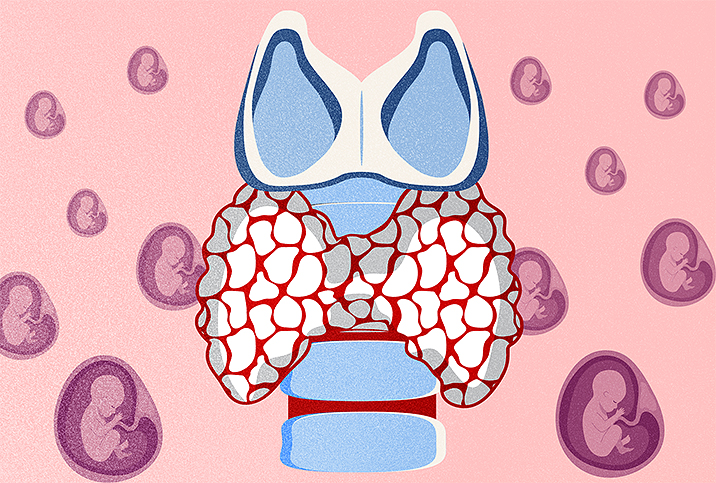Get to Know the Ties Between Hyperthyroidism and Male Fertility

Most people know the thyroid as the organ responsible for the body's metabolism. But did you know it could also be a menace to fertility?
Thyroid disorders fall under two general categories: hyperthyroidism and hypothyroidism. Hyperthyroidism occurs when your thyroid gland is working too much or, essentially, overtime. When this happens, the gland produces more of select hormones than the body requires. Hypothyroidism is the opposite—an underactive thyroid—and the gland produces a subnormal amount.
Unfortunately, these disorders can result in numerous complications, including male infertility.
Men who suffer from hyperthyroidism show the same general symptoms as women with the condition: anxiety, cardiac palpitations, tremors, fatigue, thinning hair, muscular weakness, sensitivity to changes in temperature, and more frequent bowel movements.
Find out more about the ties between hyperthyroidism and male fertility.
How are hyperthyroidism and male fertility linked?
The thyroid hormone is crucial to the function of every cell in the body, according to Alex Shteynshlyuger, M.D., the director of urology at New York Urology Specialists in New York City. Thyroid receptors, also known as nuclear receptors, are involved in the regulation of gene transcription and cell function.
However, few people know the thyroid is also involved in modulating sex drive.
Penis cells have receptors for the thyroid hormone. Additionally, blood vessels responsible for erections also have thyroid receptors in the endothelium, the wall of the blood vessels, Shteynshlyuger explained.
Some experts believe three mechanisms make the thyroid-male fertility linkage possible:
- Poor sperm quality
- Low testosterone levels
- An imbalance in a specific protein that regulates sex hormones
Poor sperm quality
The primary way hyperthyroidism impacts male fertility is by affecting sperm quality.
Increased amounts of thyroid hormone in the bloodstream lead to seminal abnormalities, researchers found in a 2018 clinical study, and erectile dysfunction (ED), according to a separate 2018 review.
In hyperthyroidism sufferers, seminal abnormalities include reduced semen volume in ejaculation, reduced sperm density, decreased motility or movement and/or speed, and altered shape or form. Hypothyroidism may increase the chances of having abnormal sperm morphology in semen analysis.
Hormonal imbalances
An underactive or overactive thyroid gland can be associated with decreased fertility, according to Iris Insogna, M.D., a reproductive endocrinologist and fertility specialist at Columbia University Fertility Center in New York City.
Hyperthyroidism, in particular, can lead to infertility by affecting the testosterone levels in the body. The condition affects the proper functioning of Leydig cells, which help in the production and secretion of testosterone.
Suppose a man's thyroid hormone levels are too high. This could lead to lower testosterone levels and potentially cause several complications, including a gradual decrease in muscle mass and tone. Even people who exercise regularly can be affected.
Thyroid disease can also have indirect effects on sexual health. Hormonal imbalances can lead to decreased libido and issues with erections or ejaculation. Hyperthyroidism is an underlying condition among men who suffer from premature ejaculation, suggested a 2022 review.
Too high or too low SHBG levels
Another factor in explaining why thyroid malfunction can be a libido killer and fertility threat is its role in regulating sex hormone-binding globulin (SHBG), also known as testosterone-estrogen binding globulin (TeBG).
The SHBG protein is produced by the liver and transports three sex hormones: testosterone, dihydrotestosterone (DHT) and estradiol. Thyroid hormones elevate the production of hepatic SHBG, which regulates the amount of testosterone your body tissues can utilize.
Insogna said men with hypothyroidism may have lower levels of SHBG than normal. Hyperthyroidism can cause SHBG levels to be too high.
These imbalances in testosterone levels in men with thyroid malfunction can cause issues with sexual functioning. Men with hyperthyroidism have subnormal testosterone and elevated estradiol levels. Such an imbalance can result in decreased libido and erectile dysfunction, according to the findings of one study.
How can you be sure it's hyperthyroidism?
How do you determine if your fertility issues are caused by thyroid dysfunction? It is best to examine sperm count and overall sperm quality first. Doctors usually order these tests if a man has been unable to father a child for an extended period.
If decreased sperm motility and unusual sperm quality are detected, a doctor may call for other blood tests to gauge the level of sexual hormones in the patient's bloodstream.
Some experts recommend a thorough workup of a patient's thyroid function to rule out a hyperactive thyroid as the cause of infertility.
Patients who fall into any of these suspect categories need to be tested through a thyroid scan. They can also undergo a laboratory test to gauge thyroid-stimulating hormone (TSH) levels and thyroxine, the primary hormone produced by the gland.
What are treatment options for hyperthyroidism and male infertility?
Fertility issues in men usually improve substantially with the treatment of the underlying thyroid disorder, Insogna said.
Surgery to remove part of the thyroid, or the entire gland, is seen as a radical treatment. Less invasive methods exist. Patients can take antithyroid medications to slow the production of hormones. They can also undergo radioiodine therapy, which may be administered over several sessions.


















